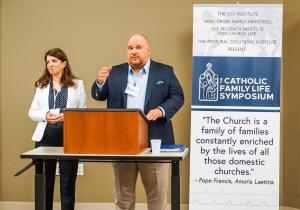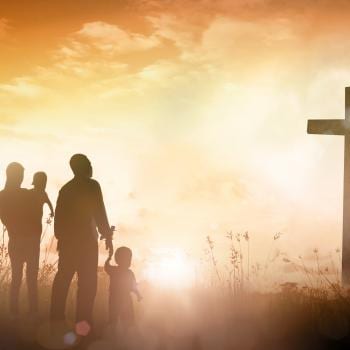The Archdiocese of Los Angeles just published an article I was interviewed for. It discusses the renewed emphasis on domestic church life–especially in light of the pandemic. My thanks to Sophia Martinson for the piece. Since we discussed a lot of things that didn’t make the final piece, I wanted to share the full conversation Sophia and I had. I hope it will help you discover the importance of your domestic church in God’s plan for bringing the world to him.
in light of the pandemic. My thanks to Sophia Martinson for the piece. Since we discussed a lot of things that didn’t make the final piece, I wanted to share the full conversation Sophia and I had. I hope it will help you discover the importance of your domestic church in God’s plan for bringing the world to him.
AngelusNews: In a nutshell, what is the domestic church — and more specifically, what you call the “liturgy of the domestic church”?
Dr. Popcak: “Domestic church” is a term the Church uses to refer to Christian families. One of the biggest blessings of the Second Vatican Council was the assertion of a “universal call to holiness.” That’s the idea that all the faithful, not just priests and religious, are called to be holy. The domestic church is part of this larger idea. It is the notion that every home is meant to be a sacred space and an outpost of grace in the world. Every Catholic household is meant to be place where we encounter God in a real and meaningful way—in all the stuff we do as families, in the way we relate to each other in our homes, and in the way we interact with our friends, neighbors and co-workers. It is the primary job of the domestic church to consecrate the world to Christ.
Unfortunately, very little has been done to help families live out this vision in our homes. Until fairly recently, the phrase “domestic church” has been employed as, at best, an aspirational term with little practical relevance.
Most of what we think of as “Catholic spirituality” is drawn from the monastic and clerical traditions. There’s a lot of value in that, of course, but the model doesn’t fit well into messy family life. The upshot is that most Catholics experience family life as an obstacle to encountering God and growing in their faith. Most Catholics feel like if they want to be spiritually fed, they have to leave home to do it. That’s absurd! Marriage is a sacrament. There is superabundant grace hidding just below the surface of every hug, every dirty dish, every diaper change in a Christian household. Sadly, even families that might be aware of this in theory have never been taught to access that grace consistently in practice. In fact, for most Catholics, it comes as a shock that they should be able to.
The Liturgy of Domestic Church Life is a model of family spirituality that seeks to challenge this unfortunate reality. The Liturgy of Domestic Church Life presents an authentic domestic-church-based spirituality that allows families to “bring Jesus home” and make the faith the source of the warmth in their homes.
In the Church there is a “ministerial priesthood” (those who are ordained) and a “common priesthood” (all the baptized). The thing is, you can’t have a priesthood without a liturgy. They are inextricably tied to each other. The primary liturgy for the ministerial priesthood is the Liturgy of the Eucharist.
But what’s the liturgy of the common priesthood? How does it make sense to talk about a “common priesthood “ without defining the liturgy over which the common priesthood presides? That’s where the Liturgy of Domestic Church Life comes in. The Liturgy of Domestic Church Life becomes the means by which the common priesthood consecrates the world to Christ by giving us a practical, yet flexible, framework for living out Christ’s sacrificial love in our homes and in the world.
AngelusNews: It seems that the concept of the domestic church is becoming more popular within Catholic circles. (For instance, the Archdiocese of Los Angeles recently hosted a town hall on the subject, and a few days before the national Catholic Family Conference took place.) Why do you think members of the Church have paid special attention to this subject lately, during the coronavirus?
Dr. Popcak: Catholics have a tendency to think that the parish is meant to be the center of our faith life. But that’s not what the Catholic theology of Church actually teaches. In reality, the parish church exists to support the Christian life and ministerial efforts of the domestic church—the family. In Amoris Laetita, Pope Francis calls the Church “a family of families.” In practice, the lived experience of Catholicism is too inwardly focused on maintaining the parish instead of forming the family. Our focus is entirely backward. In fact, Catholic ecclesiology demands that our experience of Church be outwardly focused. The parish is meant to feed the life of the domestic church and empower it for ministry and witness in the world.
The pandemic is forcing a crisis that is challenging this—in my view—deeply flawed paradigm that represents the lived experience of contemporary Catholicism. As truly painful as it is to be separated from the sacraments, the pandemic is forcing us to rethink how we “do church.” God is giving us an opportunity to rediscover an idea that has been hidden in plain sight since the early Church (see The Book of Acts) and definitely since Vatican II. Namely; it’s the Catholic home—not the parish, the parish school, or diocesan chancery—that is meant to be the crucible of intentional discipleship and primary outpost of evangelization and positive social change. Everything a diocese or parish does should be ordered to the development of the domestic church, which is the “building block of civilization” and “school of love and virtue.” Although motivated by good intentions, the institutional Church currently suffers by trying to bear burdens it was never meant to carry—burdens that are the rightful purview of the domestic church.
Whatever else God might be doing through this crisis, I believe he is challenging his Church to adhere more faithfully to its own vision for how we are meant to function as his family on earth.
AngelusNews: You’ve written about the parallels between the liturgy of the Eucharist and the liturgy of the domestic church. As you know, most families are now unable to attend Mass in person. What are the challenges of living the domestic church liturgy without the Eucharist?
Dr. Popcak: You can’t have a domestic church or a Liturgy of Domestic Church Life without the Eucharist. The Eucharist is the summit and source of our faith. It’s what facilitates communion with God and makes authentic communion with others possible.
Although the church has not defined the term “domestic church,” my working definition is “a household of persons, united to God and each other through the sacramental life of the Church, and committed to living out Christ’s love in their homes and in the world.”
The Eucharist is both central to this vision and the fuel for this vision. As one Eastern-Rite Bishop who heard me present this model said, in his mind, The Liturgy of Domestic Church Life represents the mystical vehicle that allows the grace of the Eucharist to be communicated to all the world through the living Body of Christ.
That said, there have been times in the history of the Church were people were discouraged from receiving the Eucharist more than once-a-year or even once-in-a-lifetime. I’m not saying that was necessarily good, but I am saying that grace received through the Eucharist does not have an expiration date. Receiving the Precious Body and Blood of Christ, even once, facilitates a personal encounter with Christ that has the power to change everything—especially our home life—forever. A domestic church aspires to be the embodiment of the Eucharistic vision of love.
AngelusNews: You’ve written about different ways for families to live the liturgy of the domestic church — through the “rites” of relationships, rituals, and reaching out. Could you offer a few practical tips on how quarantined families can live these rites?
“Rites” represent the building blocks of liturgy. As we envision it, the Liturgy of Domestic Church Life has three rites, each of which corresponds to three-fold mission we receive in baptism to be priests, prophets and royals.
The Rite of Christian Relationship equips families to grow in the priestly mission of baptism. By living out Christ’s sacrificial love in the home, Christian families learn to overcome the selfish and sinful ways we naturally tend to treat each other. Practices that make this possible include things like…
-1) facilitating what psychologists call, “secure attachment” by responding promptly, generously, consistently, and cheerfully to each other’s needs.
-2) demonstrating generous affection that represents the incarnate love of Christ,
-3) practicing what we call “discipleship discipline” a model of childrearing founded on the “Preventive System” of discipline developed by St John Bosco. This method sees discipline as a two way street that not only sees to the character formation of the child, but leads to fosters spiritual growth and holiness for the parent. My book, Parenting With Grace discusses this in depth.
The Rite of Family Rituals offers families the means to exercise the prophetic mission of baptism. A prophet is meant to call people—in word and action—to live authentic Christian lives. By developing strong family rituals for working, playing, talking, and praying together (four categories that cover almost every type of human activity) Christian families model how to have a godly relationships with work, leisure, intimacy, and faith.
The Rite of Reaching Out represents the royal mission of baptism. To serve with Christ is to reign with him! God wants to use our families to change the world. Christian families celebrate this rite by cheerfully serving each other in the home, by thinking of others while being a family (by practicing generous hospitality and doing things like passing on gently used clothes, toys, etc to others in need, and making extra meals for struggling neighbors), and by serving together in their parish and community (as opposed to letting service be one more “activity” that tears them apart).
AngelusNews: What is your hope for the domestic church going forward from this time of difficulty? What do you hope Catholic families will learn or gain from it?
I hope this crisis will force us to reckon with the fact that the domestic church IS church. It isn’t meant to be a patronizing term the Church uses to say to families, “Why yes, dear! Of course you matter too.”
My goal is two-fold. First, I would like to challenge families to realize that their homes are meant to be spiritual powerhouses; lighthouses ablaze with the sacrificial love of Christ that serve as a beacon that calls the world into relationship with their Father.
Secondly, I would like to challenge the institutional Church to stop thinking—incorrectly—that “family ministry” is only about doing marriage prep or ministering to hurting families. It is certainly about that, but “family ministry,” in the fullest sense of the term, is meant to refer to the process by which we equip Christian families to do the heavy-lifting of forming intentional disciples, and serving as the primary outposts of evangelization and positive social change in the world.
TO LEARN MORE: Please join our Facebook Discussion Group, CatholicHOM (Households on Mission)—Family Discipleship or visit CatholicCounselors.com
Dr. Greg Popcak is the Executive Director of CatholicCounselors.com, the author of over 20 books, the co-host of More2Life (airing M-F at 10amE on EWTN/SiriusXM130) and the Consulting Director of the Peyton Institute for Domestic Church Life an outreach of Holy Cross Family Ministries.












